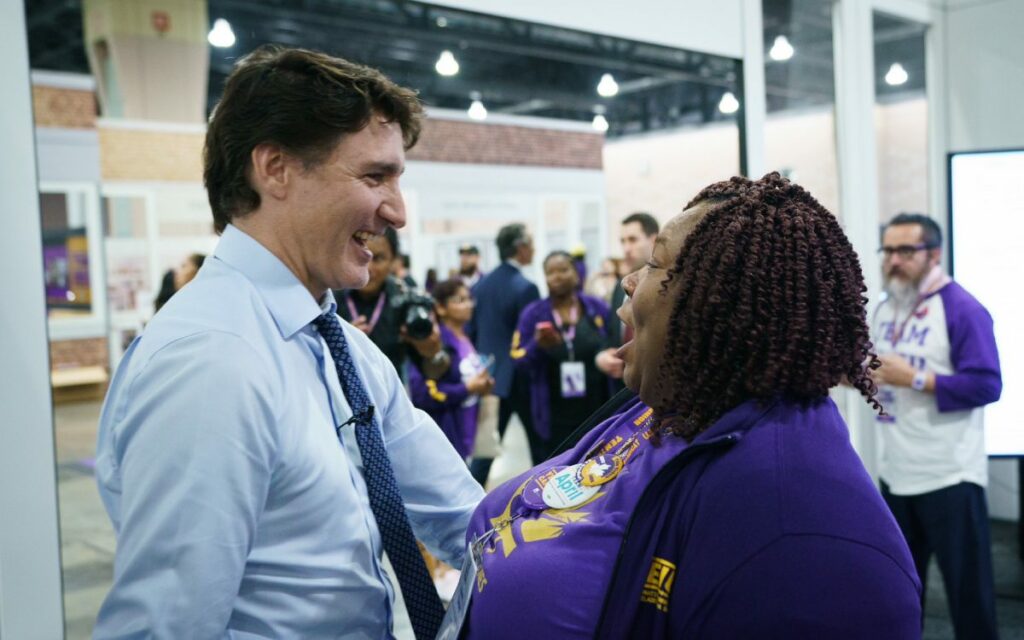
The Desmarais family, the owners of the appropriately named Power Corporation have had an intimate connection with Canadian prime ministers for decades. Pictured: Prime Minister Justin Trudeau. Photo Credit: Justin Trudeau/X.
Have you ever wondered why Canada has been run by Quebecers for most of the past 60 years? The answer begins with a book almost 100 years old.
In his 1928 book Propaganda, the father of public relations Edward Bernays wrote,
“A presidential candidate may be ‘drafted’ in response to ‘overwhelming popular demand,’ but it is well known that his name may be decided upon by half a dozen men sitting around a table in a hotel room.
“In some instances the power of invisible wirepullers is flagrant.”
Canada is no different. The Desmarais family, the owners of the appropriately named Power Corporation have had an intimate connection with Canadian prime ministers for decades.
Pierre Trudeau became a Liberal MP in 1965 and joined the second minority government of Montreal’s own Lester B. Pearson. Shortly after Paul Desmarais took over Power Corporation in 1968, Trudeau also took over as prime minister. Peter C. Newman relayed the history in a chapter entitled, “King Paul.”
“One of Desmarais’ favorite collectibles is Pierre Trudeau, who remains on Power Corp’s international advisory board,” wrote Newman in his 1998 book The Canadian Establishment: The Titans, How the New Canadian Establishment Seized Power.
“Plans for Trudeau’s candidacy had first been hatched in early 1968 at the offices of Power Corporation, at Friday–night meetings presided over by then–Power vice–president Claude Frenette. In August of that year, two months after Trudeau swept the country, the new PM flew to visit Desmarais at Murray Bay.”
Apart from the blip of the Joe Clark Conservatives in 1979-80, the Pierre Trudeau Liberals ruled from 1968-1984. The long rule was barely underway when Paul Desmarais began a relationship with lawyer and Progressive Conservative Brian Mulroney.
“In 1972, Desmarais hired Mulroney as negotiator during a labour dispute at his paper La Presse. In apparent appreciation of Mulroney’s work, Desmarais became Mulroney’s biggest financial backer, starting with his leadership bid in 1976,” explained Robert Hacket and co-authors in the 2000 book The Missing News: Filters and Blind Spots in Canada’s Press.
Mulroney unseated Joe Clark as PC Leader in 1983, despite never holding an elected office. In 1984, he became prime minister, and, according to Hacket, never forgot Paul Desmarais.
“In September 1990, Mulroney appointed John Sylvain, Desmarais’s brother-in-law to the Senate, one of eight controversial appointments that ensured the passage of the Goods and Services Tax. In June 1993, Mulroney appointed Desmarais’s brother, Jean Noël Desmarais, to the Senate as part of a flurry of patronage appointments. Now Mulroney has returned to work for Power Corporation’s long-time law firm, Ogilvy Renault.”
Jean Chrétien, a cabinet minister in the Trudeau era, sat on the board of Power Corp. subsidiary Consolidated Bathurst in the late 1980s. His daughter France married Desmarais’ son Andre, the current president of Power Corp.
Remarkably, Chrétien’s successor Paul Martin was involved with Power Corporation before Desmarais took over. He moved to Montreal and joined the company in 1966, becoming executive assistant to Power Corp president Maurice Strong, who later became the first executive director of the UN Environment Programme, CEO of Petro Canada, and head of Ontario Hydro.
Martin, whose father was a cabinet minister under Pearson, became VP of Power Corp in 1969, then president of its Canada Steamship Lines in 1973. In 1981 Martin and a business partner bought CSL from Desmarais’ Power Corp for $180 million. Martin became the sole owner in 1988, the same year he ran in the federal election as a Liberal and won the Montreal riding of LaSalle-Emard.
After Liberal leader John Turner resigned in 1990, Martin ran against Chrétien for the Liberal leadership. With Mulroney in power at the time, Desmarais must have been laughing. Chrétien won and became prime minister in 1993. His finance minister Martin succeeded him in 2003 and ruled until 2006.
The Stephen Harper Conservative decade was a long exception to Quebec prime ministers, but his inevitable successor was first elected two years after the Conservatives took the reins.
Justin Trudeau’s online prime ministerial biography makes a remarkable claim: “In 2007, he built a grassroots campaign to win the Liberal Party nomination in the Montreal riding of Papineau.”
Grassroots indeed, child of Montreal and Pierre Elliott Trudeau that he was.
The campaign of Mr. Grassroots was so well-funded when he ran for the Liberal leadership, organizer Warren Kinsella called him “a human ATM.” Trudeau became party leader in 2013 and prime minister in 2015.
The Desmarais connections continued. Senator Peter Harder was Trudeau’s Government Representative in the Senate from 2016 until 2020. Harder is a former Board Member of Power Financial Corporation, a wholly owned subsidiary of Power Corp, and a former President of the Canada-China Business Council, founded in 1978 by Paul Desmarais.
Barring a political miracle, Trudeau will be out by 2025. Current polls suggest Pierre Poilievre will take his place, but no one reigns forever. If anyone’s wondering who the prime minister in ten years will be, they should probably ask the Desmarais’ atop Power Corp. After all, power is their business.




















